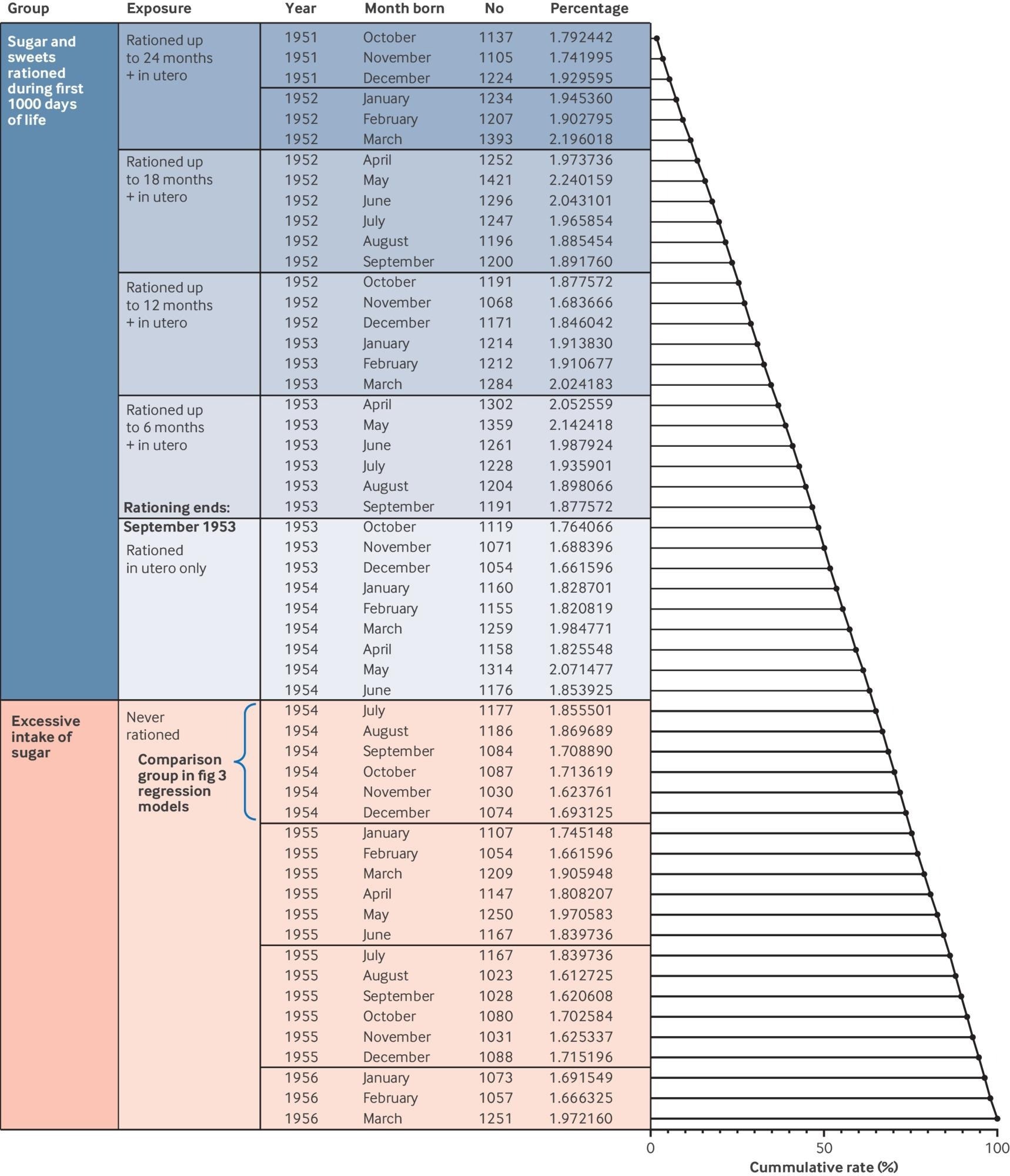A rare “natural experiment” from 1950s UK sugar rationing reveals that lower sugar exposure in the first 1,000 days of life may lead to healthier hearts and fewer cardiovascular events decades later.

Research: Exposure to sugar rationing in first 1000 days after conception and long term cardiovascular outcomes: natural experiment study. Image Credit: ya_create / Shutterstock
In a recent study published in the journal BMJ, researchers leveraged a "natural experiment" from post-war 1950s UK sugar rationing to explore the long-term cardiovascular impacts of early-life nutrition. Specifically, the study compared the adult heart health of individuals born during the rationing period (low-sugar exposure cohort) with that of those born just after it was lifted (higher-sugar exposure cohort).
Study findings revealed that individuals exposed to sugar rationing during their first 1,000 days had significantly lower risks of heart attack, stroke, and heart failure decades later, highlighting a strong association between early-life sugar intake and long-term heart health. These findings suggest that lower early-life sugar exposure may confer lasting cardiovascular benefits, thereby adding to the evidence supporting limiting added sugars during pregnancy and infancy.
Background
The "first 1,000 days" is a popular term in the medical community, referring to the period from conception to a child's second birthday. A growing body of research increasingly recognizes this period as a critical window for fetal development, with nutrition and other environmental factors potentially programming an individual's lifelong cardiometabolic health.
Parallel studies in animal models suggest that early-life sugar overexposure can lead to adverse chronic health outcomes. Unfortunately, while direct human evidence on the long-term benefits of early-life sugar restriction has been limited, the high levels of added sugars in many infant and toddler foods are a significant concern.
About the study
The present study aims to address this knowledge gap and strengthen understanding of added sugar in infant diets by leveraging a "natural experiment" design, capitalizing on a unique historical event: the end of post-war sugar rationing in the United Kingdom (September 1953). The study aims to establish the association between early-life sugar intake (availability, used as a population-level proxy for individual exposure) and adult life cardiovascular health.
Study data were retrospectively obtained from the UK Biobank (UKB), an extensive population health database, and comprised a cohort of 63,433 participants born between October 1951 and March 1956. This specific timeframe was chosen because it perfectly encapsulates the end of the UK's national sugar rationing in September 1953.
Notably, unlike most policy changes that take years or even decades to implement, the UK's national sugar rationing triggered a sharp and immediate surge in public sugar consumption, effectively creating two distinct groups.
Included study participants (n = 63,433) were quasi-experimentally assigned to groups (subcohorts) based on their birth date, which determined their level of exposure to sugar rationing during the critical first 1,000-day window. These groups ranged from individuals exposed in utero and for their first two years of life (born 1951–1953; low-sugar exposure cohort) to those never exposed (born late 1954–1956; higher-sugar exposure cohort).
Study data of interest included sociodemographic information (age, sex, race/ethnicity, etc.) and electronic health records (EHRs), the latter of which were leveraged to track the incidence of six primary outcomes: cardiovascular disease (CVD), myocardial infarction (heart attack), heart failure, atrial fibrillation, stroke, and CVD-related mortality. A subset of this cohort also underwent cardiac magnetic resonance imaging (MRI) to assess the impacts of differential sugar intake on subclinical heart structure and function.

Sample distribution of births by calendar months and exposure to sugar rationing. Sugar rationed group is represented in blue; group that was never exposed to sugar rationing is represented in orange. First group of those never exposed to sugar rationing is labelled and was used as control group to assess association of early life rationing exposure with cardiovascular outcomes
Study findings
Study outcomes revealed that the longer an individual was exposed to sugar rationing in early life, the lower their risk of cardiovascular problems in adulthood, establishing a dose-dependent association between early-life (first 1,000 days) sugar exposure and long-term cardiovascular health.
The analyses demonstrated that the most protected group consisted of those exposed to rationing in utero and during the first one to two years of life. Compared to individuals who were never exposed to rationing, this group showed significantly reduced risks across CVD (20% lower risk [HR 0.80]), myocardial infarction (25% lower risk [HR 0.75]), heart failure (26% lower risk [HR 0.74]), atrial fibrillation (24% lower risk [HR 0.76]), stroke (31% lower risk [HR 0.69]), and CVD-associated mortality (27% lower risk [HR 0.73]).
Most importantly, these computed risk metrics were found to translate into measurable real-world cardiovascular benefits, on average, the most exposed group developed cardiovascular disease approximately 2.53 years later than the unexposed group, a finding supported by cardiac MRI data, which also found that the rationed group had a small but significant increase in left ventricular ejection fraction (~0.84 percentage points higher) and stroke volume index (~0.73 mL/m² higher), both indicators of improved cardiac function.
All-cause mortality was also lower in the longest-exposed group (parametric model HR ~0.77).
The study’s mediation analysis indicated that incident diabetes and hypertension jointly mediated approximately 31% of the association, while birth weight accounted for about 2%, suggesting that these mediators do not fully explain the observed link, but causality cannot be inferred.
Findings were robust in competing-risk models, absent for placebo outcomes (osteoarthritis, cataract), and directionally supported in an external UK cohort (ELSA), with null results among contemporaneous non-UK-born controls.
The authors also noted that the UK Biobank sample tends to represent a healthier subset of the general population, which may limit the generalisability of these findings to broader populations.
Conclusions
The present study provides compelling, long-term, population-scale evidence establishing an association between early-life sugar intake (dose-dependent) and later-life CVD outcomes. Importantly, the benefits appear to extend beyond the effects of diabetes and hypertension, suggesting that early sugar restriction may have a more direct or unmeasured protective effect on heart health.
The findings underscore that the first 1,000 days of life are a critical developmental window for nutritional interventions that may reduce future cardiovascular disease risk, while emphasizing that causal inference is limited by the observational design.
Journal reference:
- Zheng, J., Zhou, Z., Huang, J., Tu, Q., Wu, H., Yang, Q., Qiu, P., Huang, W., Shen, J., Yang, C., & Lip, G. Y. H. (2025). Exposure to sugar rationing in first 1,000 days after conception and long-term cardiovascular outcomes: natural experiment study. BMJ, 391, e083890. DOI 10.1136/bmj-2024-083890. https://www.bmj.com/content/391/bmj-2024-083890